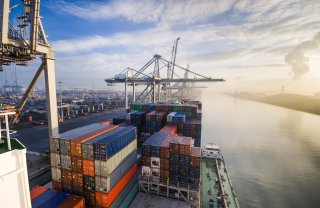Information about Transboundary Shipments of Hazardous Wastes
On this page:
What is hazardous waste?
Hazardous waste is waste that is dangerous or potentially harmful to our health or the environment. It can be a liquid, solid, contained gaseous material, or sludge. Some examples include discarded commercial products, like cleaning fluids or pesticides, or the by-products of manufacturing processes.
Not all hazardous wastes that are managed in the United States originate in this country. Similarly, not all wastes generated in the United States are managed exclusively in this country. Hazardous wastes are sometimes shipped to or from other countries for treatment, disposal, or recycling. Transboundary movement of hazardous waste that is based on environmental and economic grounds with agreement between the exporting and receiving country, can help ensure that waste is reused or recycled in an environmentally sound manner. For example, countries benefit from exporting waste to a country that has better technical capacity to manage those wastes. Countries can also benefit economically from importing waste when it provides raw materials for recycling or when it provides used products that can be refurbished and reused.
How are U.S. imports and exports of hazardous waste managed?

When hazardous waste is shipped across multiple countries there can be a higher risk of mismanagement from unsafe transport, recycling and disposal practices. To ensure that international shipments are handled in a manner that protects human health and environment, the Resource Conservation and Recovery Act (RCRA) contains management provisions for both hazardous waste imports and exports to help ensure safe management of shipments.
The majority of U.S. hazardous waste trade occurs with Canada and Mexico, but the United States also engages in shipments with other countries. Importers and exporters of hazardous wastes must comply with applicable domestic laws and regulations, the relevant international agreements, and regulations established by the other countries involved in the imports, exports, and any related transit of the hazardous wastes.
As a member country of the Organization for Economic Cooperation and Development (OECD), the United States participates in the multilateral waste agreement covering shipments of hazardous waste for recycling between the member countries. In addition, the United States has established bilateral waste agreements for importing and exporting hazardous waste with Canada and Mexico. Costa Rica, Malaysia and the Philippines have separate import-only waste agreements with the United States to enable shipments to the United States for recycling or disposal. Under U.S. law, the current regulations governing U.S. imports and exports of hazardous waste are described in title 40 of the Code of Federal Regulations (CFR) Part 262 Subpart H - Transboundary Movements of Hazardous Waste for Recovery or Disposal.
